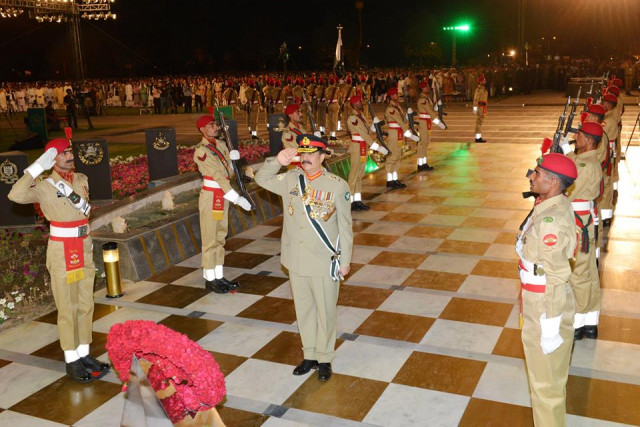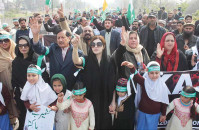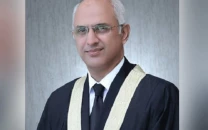Martyrs’ Day address: Army chief warns ‘rebels of the state’
Calls on anti-state elements to submit to Constitution.

General Raheel Sharif laying floral wreath at Yadgar- e - Shuhada on April 30, 2013. PHOTO: ISPR
Issuing a stern warning to all ‘anti-state elements’, army chief General Raheel Sharif on Wednesday called on them to accept the country’s Constitution unconditionally and join the national mainstream.
“It is our earnest desire that all elements fighting against the state unconditionally submit to the Constitution and rule of law, and come back to the national mainstream,” he said in a speech at a ceremony held at the General Headquarters to mark Yaum-e-Shuhada (Martyr’s Day).
The army chief said Pakistan Army backed all efforts to eliminate terrorism and restore peace in the country. At the same time, however, he made it clear that there was no room for any doubt on ‘our ability to deal with rebels of the state’.
“The brave people of Pakistan and the army have the full capacity to take such [anti-state] elements to task.”
This was Gen Raheel’s first public speech since he became the army chief in November last year. It came against the backdrop of apparent tensions between civil and military authorities over the trial of former president Pervez Musharraf.

But the carefully-worded speech, in which Gen Raheel unequivocally supported democracy and freedom of media, indicated tensions between the civil and military leadership had defused.
The ceremony was attended by a large number of dignitaries, including Defence Minister Khawaja Asif and former army chief Ashfaq Parvez Kayani.
Support for democracy
Lending his unequivocal support to the civilian government, Gen Raheel insisted that “democracy is the only way forward” to join developed nations of the world. “The armed forces of Pakistan believe in stable democracy, supremacy of the Constitution and the rule of law,” he said.
He added that it was important that all institutions follow “the Quaid-e-Azam’s golden principle of unity, faith and discipline” and work together for the country’s prosperity.
The army chief said despite multiple challenges, Pakistan was on road to progress and prosperity. He said Pakistan’s armed forces were keeping a ‘close eye’ on all internal and external threats and were fully capable of dealing with them.
“The armed forces of Pakistan will continue to play their role for national security and development and prosperity of the motherland.”
He said the ‘blood of martyrs’ would not go in vain and “it is our duty to give the next generation a stable and prosperous Pakistan.”
Development in Balochistan
Gen Raheel described Pakistan Army as a representative of all the four provinces, key for national unity, symbol of nationalism and guarantor of the country’s defence.
He highlighted the development work undertaken by the military in the restive Balochistan province. “The induction of over 20,000 officers and soldiers in Pakistan Army from Balochistan is a testament to the province’s trust in the military,” he remarked.
Kashmir dispute
The army chief supported peace talks with India but reiterated that Kashmir is the ‘jugular vein’ of Pakistan.
“It is important that the longstanding dispute be resolved in line with the aspirations of Kashmiri people to ensure durable peace in the region,” he stressed. “Sacrifices of Kashmirs will not go in vain. Pakistan Army is in favour of peace but is always ready to respond to any aggression in a befitting manner.”
Freedom of media
In the wake of recent incidents, Gen Raheel acknowledged the role of media and civil society in nation building.
“Media has always played a crucial role in forming the public opinion in favor of national security. We believe in media freedom and responsible journalism and acknowledge their sacrifices.”
Published in The Express Tribune, May 1st, 2014.



















COMMENTS
Comments are moderated and generally will be posted if they are on-topic and not abusive.
For more information, please see our Comments FAQ